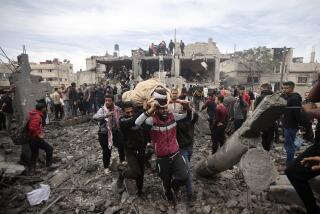NEWS ANALYSIS : Bosnia Peacekeeping Role Makes U.N. Forces Pawns
- Share via
ZAGREB, Croatia — The see-no-evil neutrality embraced by the United Nations in the midst of savage nationalist bloodletting has step by step transformed the 50,000-strong U.N. Protection Force in the Balkans from a peacekeeping mission into an army of pawns.
The international community’s determination to limit its involvement in the war-torn region to humanitarian ventures--instead of military intervention to stop the fighting--has increasingly put the men and women of a misguided mission in harm’s way.
Hundreds of U.N. troops are being held hostage by angry Serbian rebels in Bosnia-Herzegovina as a hedge against further use of NATO air power.
The 1,200 Bangladeshi soldiers in embattled Bihac in northwestern Bosnia are battened down in their quarters to escape the artillery siege raining death onto the local civilians they were deployed to protect, just as U.N. contingents assigned to besieged eastern enclaves became fellow captives with the Muslims in their care.
From the rebel-encircled enclaves of Srebrenica, Gorazde and Zepa, to the mission headquarters here that Croatian Serbs have threatened with Frog missiles, U.N. soldiers and statesmen are at the mercy of the Serbian warriors who have always had the upper hand and now show no restraint in their will to use it.
By steadfastly refusing to take sides, the U.N. mission is seen by its intended beneficiaries not as neutral so much as indifferent.
Symbolic displays of NATO resolve to protect U.N. “safe areas” have failed to impress the rebel forces attacking them or to convince the civilian victims that the outside world even cares.
With its choice of a peacekeeping mission over military intervention at the start of the conflict in Bosnia more than 2 1/2 years ago, the international community gambled that ignoring injustices would facilitate a pragmatic settlement and at least a tentative peace.
But with the relentless rebel assault on Bihac--one of six purported U.N.-protected safe zones--it has become clear that the often-brandished but little-used sword of North Atlantic Treaty Organization air power is not taken seriously by the advancing Serbian forces.
Nor are the international community’s vows to prevent the fall of Bihac being given much weight by Bosnian government forces, who have been given an ultimatum by the surrounding Serbs to surrender or die.
The deterioration of U.N. and NATO authority in the Balkans has been gradual but steady, starting with the proclamation of a “no-fly” zone over Bosnia more than two years ago that is violated almost daily. The alliances’ lack of respect accelerated with the non-enforcement of other so-called safe areas in eastern Bosnia, and more recently with the failure to enforce weapons exclusion zones around Gorazde and Sarajevo.
Four Serbian planes caught on a Feb. 28 bombing run in central Bosnia were shot down by NATO in the only enforcement action of the flight ban, and several pinprick air strikes have been launched against antiquated artillery in the two exclusion zones.
But Serbian nationalist rebels who have been the targets of the few punitive NATO actions have concluded that neither the U.N. mission nor the military hierarchies making up NATO have any intention of getting any more deeply or effectively involved.
“The Serbs know now that the price for shooting at U.N. troops or at U.N. planes is that they lose a rusted, 40-year-old gun or a derelict tank,” said a Western diplomat in this Croatian capital. “That’s not likely to constitute much of a deterrent.”
Compounding the U.N. mission’s lack of credibility with any of the warring factions is the piecemeal approach to negotiating local cease-fires that has taken precedence over a comprehensive strategy for combatting the aggressive nationalism at the root of the regional conflict.
The mission is also hampered by the revolving door of administrative leaders and commanders, with virtually none of the major players having more than a year of familiarity with the complex region that began its slide toward violent confrontation in the late 1980s.
There is little recognition among the mission leaders or their legion of information officers of the deja vu quality of the Bihac crisis, a carbon copy of the humiliating contest of wills the U.N. peacekeeping force lost to Serbian rebels in Gorazde in April.
In both deadly Serbian offensives, the U.N. commander for Bosnia, British Lt. Gen. Michael Rose, disputed the significance of the safe-area violations, then blamed the Bosnian government for spurring the attacks by trying to recover homes and territory lost to the Serbs at the start of the war.
When diplomatic appeals for respect of the safe areas were ignored by the advancing gunmen, U.N. officials claimed they were unsure exactly what territory was to be protected. Even after the mission succeeded in shrinking the area of its responsibility to the immediate vicinity of Bihac city--encompassing only 32 square miles of the 800-square-mile “Bihac pocket”--moves to enhance security for the embattled populations were slowed by the arthritic bureaucracies of both NATO and the United Nations.
Serbian rebels had already conquered one-third of the Bihac safe area by Saturday and were threatening a rout of the entire haven, yet the United Nations had still not acted on NATO recommendations that the area be declared a demilitarized zone.
The U.N. mission has been assuring the international community that neutrality continues to be the best of its few bad choices for influencing the Balkan conflict.
And the outside world’s reluctance to consider the alternative to a failed peacekeeping mission--military intervention--bolsters the U.N. hierarchy’s determination to keep its fig leaf in place over the unraveling Balkans.
More to Read
Sign up for Essential California
The most important California stories and recommendations in your inbox every morning.
You may occasionally receive promotional content from the Los Angeles Times.














